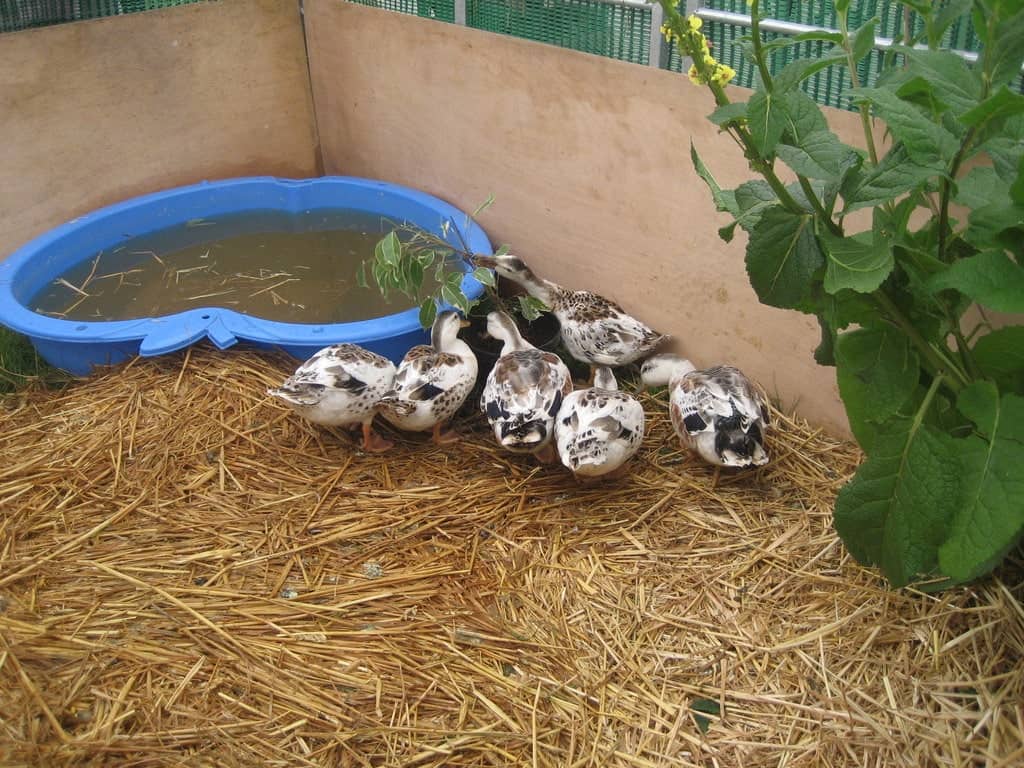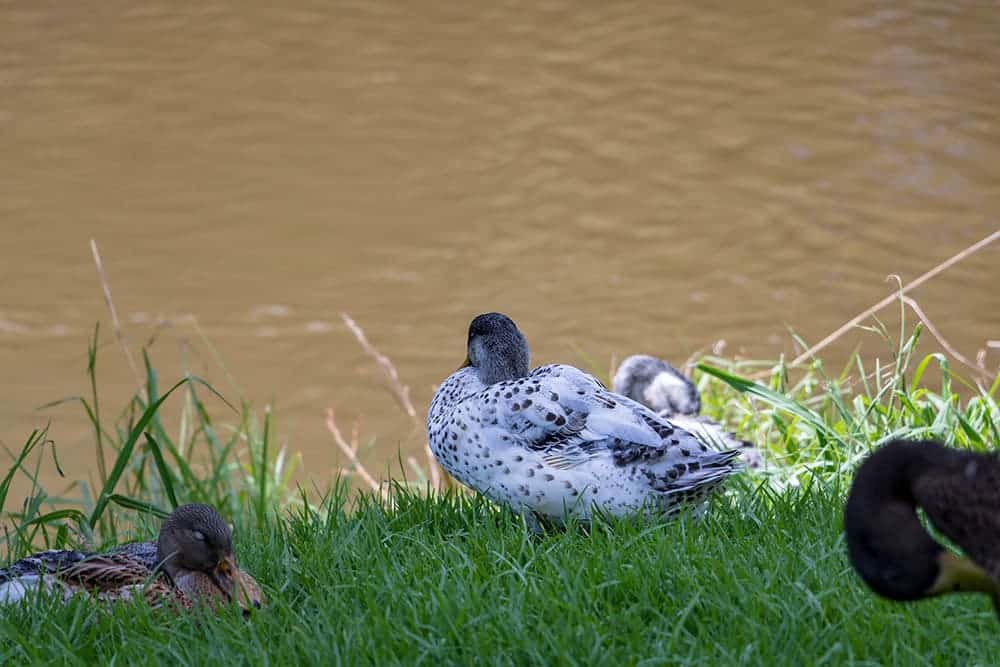Silver Appleyard Miniature ducks are popular for so many reasons. They have a docile, sweet appearance and produce well. These agreeable little ducks add beauty, personality, and appeal to your garden and yard space. Many owners would claim they are a joy to have in any flock.
They have quite a few admirable characteristics that you might find attractive, we’re going to go over all the aspects of the breed in greater detail so you can see if they sound like a good fit for your barnyard.

Quick Facts about Silver Appleyard Miniature Ducks

| Breed Name: | Silver Appleyard Miniature |
| Place of Origin: | Gloucestershire |
| Uses: | Ornamental |
| Drake Size: | 2.25 pounds |
| Duck Size: | 2 pounds |
| Color: | White, black, green |
| Lifespan: | 4-8 years |
| Climate Tolerance: | Cold hardy |
| Care Level: | Easy |
| Production: | Low |
| Temperament: | Friendly, curious |
Silver Appleyard Miniature Duck Origins
The Silver Appleyard duck was bred in the 1930s by Reginald Appleyard, a well-renowned poultry breeder. This man was an expert in the field who owned the Priority Waterfowl Farm. Years later, the Silver Appleyard duck would become a bantam waterfowl in Gloucestershire, UK.
They were bred to be an ornamental duck, and not so much for practicality. It came from Folly Farm, where breeders aimed to create a miniature version of the Silver Appleyard that came into being in the 1980s thanks to breeder Tom Bartlett.
The Silver Appleyard Miniature was standardized in 1997 by the British Waterfowl Association. Even though the breed was introduced in the 1960s, no American association accepts the Silver Appleyard Miniature duck.
Today, these ducks are relatively common and valuable on small-scale farms.
Silver Appleyard Miniature Duck Characteristics
The Silver Appleyard Miniature duck seems to get a thumbs up in just about every category. They are hardy, friendly, beautiful, and beneficial for your garden.
Silver Appleyard Miniature ducks tend to be very inquisitive and cheerful in nature. They get along well with other flock mates and barnyard friends. They can be pretty vocal, so keep this in mind before purchase. The females are generally louder than the males, and their vocals are a little harsher. The silver Appleyard miniature tends to be pretty docile with handlers; many would even call them friendly.
These ducks love to adventure, so they will stay busy around the barnyard, foraging for goodies. They are suitable for gardens because they eat a lot of pests. But be careful where you allow access—they can pluck up new or developing plants, too.
These are very much flock-oriented animals, depending on the companionship of other ducks. So, make sure that you always have several ducks at a time.
Uses
The Silver Appleyard Miniature duck is bred for ornamental use only. They are not designed to be meat or egging birds with extraordinary capabilities. But that doesn’t mean they don’t deliver. You can still expect to see pretty regular egg production with these birds.
If you are serving two or three people, this bird has compact, flavorful meat. However, it is not good for larger gatherings or meals.
These ducks have no problems sitting on a nest of eggs, even those that aren’t theirs, hatching them into ducklings. They make excellent and dependable mothers, so they serve a purpose for growing flocks. Despite them being small, they do tend to be scheduled layers and tend to go broody often.
Appearance & Varieties
The Silver Appleyard Miniature duck is bred to a strict standard, and all of these ducks have one look to go by. Males have a greenish-black head with a silver-white throat and ring. Their wings are solid black and green with blue tips. And they have the classic tail curl to determine gender.
Females are creamy white on their underbodies and partially on their wings. They do have blue-tipped wings and a speckled head and neck appearance.
Population, Distribution & Habitat
Silver Appleyard Miniature ducks are reasonably common, so you shouldn’t have much trouble finding a couple of hatchlings. You can check it at local hatcheries near you or feed shops and private breeders. Always aim to buy healthy ducklings to prevent disease transmission.
Like all domesticated ducks, these ducks require a constant freshwater source where they can wash off their beaks, getting debris out of their nostrils. This is going to be a central part of owning ducks. Even though they can drive with an unlimited water supply, it’s not recommended. You should get them as much water access.
They require a specific diet. We recommend getting the commercial brain in addition to letting them naturally forage. If they are in a contained space, make sure they’re getting the correct amount of nutrients and supplements if needed.
Since these ducks love slugs and snails in particular, they can make very good assets to your garden areas. However, don’t let them around plants that are too immature. They tend to try to eat youngsters.

Are Silver Appleyard Miniature Ducks Good for Small-Scale Farming?
The Silver Appleyard Miniature is an absolutely perfect choice if you love having ducks around for ornamental use. They have a gorgeous appearance and forage for themselves. They tend to mind their own business and are generally friendly with keepers.
If you’re looking for that one duck who will always lay out a pile of eggs, you definitely need to get some of these beauties. These little ladies tend to go broody often and won’t have a problem hatching eggs that don’t belong to them. Consider them the moms of the duck house.
Related Reads:
- Silver Bantam Duck: Pictures, Facts, Uses, Origins & Characteristics
- 11 Colorful & Beautiful Duck Breeds (with Pictures)
Featured Image Credit: JoshuaDaniel, Shutterstock
